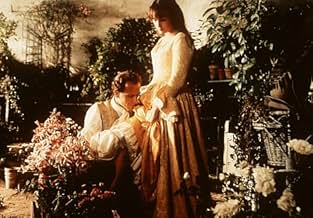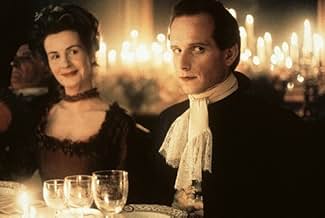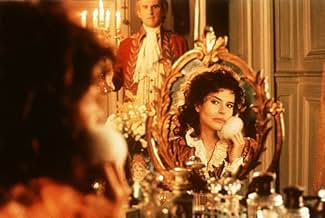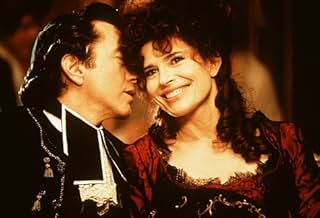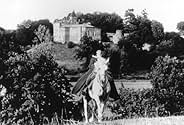Ridicule
- 1996
- Tous publics
- 1h 42m
IMDb RATING
7.3/10
8.4K
YOUR RATING
To get royal backing on a needed drainage project, a poor French lord must learn to play the delicate games of wit at court at Versailles.To get royal backing on a needed drainage project, a poor French lord must learn to play the delicate games of wit at court at Versailles.To get royal backing on a needed drainage project, a poor French lord must learn to play the delicate games of wit at court at Versailles.
- Nominated for 1 Oscar
- 20 wins & 17 nominations total
Judith Godrèche
- Mathilde
- (as Judith Godreche)
Featured reviews
I have seen this film recently on video after having missed it at the cinema and on TV. I knew it would be all about cruelty of words and superficiality of elites. Indeed, this film is a true gem, very well played, sharp and quick. It tells the story of a young provincial nobleman discovering the Versailles Court as he tries to get funding for his project. What he finds will lead the nobility to its brutal end 6 years later: futility, self-conceit, disinterest to the people's problems, superficiality of relationships (all of which still pervade it modern French elite, to some respects as was evident from revelations of Mitterrand's shameful reign). Of course the political message is important. But equally if not more important -or pleasurable- are the dialogues. French can be so brutal, insidious, cruel, tortured, witty when used a propos that I'm not sure the non-French speakers could get the most of the dialogues. Certainly the absolutely brilliant rhymes contest would be somehow lost in English subtitles. A very good 9/10 for this movie, and a bit less if you don't get the dialogues.
RIDICULE deserved all the lavish praise it engendered upon its release in 1996. As a period piece (France in the final throes of King Louis XVI) it is one of the finest - visually, contextually, musically, AND it is wonderfully intelligent! Unlike many period pieces that serve as elegant decoration for meager stories, RIDICULE carries pungent statements about the decline of aristocracy and the whispers of the cause of democracy.
A poor humanitarian travels from the ill swamps of Southern France to the court of Versailles to seek funding from the Royal Court to correct the deplorable living conditions ignored by the King. Upon arrival he finds a vapid society diverting attention from problems that plague the kingdom by inventing word games whose purpose is to find who can is best able to ridicule the fellow shallow players of this verbal chess game. Finding he has the gift to outclass the court with his verbal wit our humanitarian is 'accepted' into nobility and spars with the finest. For a while our humanitarian's focus is diffused by women, duels, and other diversions of the court until he finally regroups his cause and returns to the suffering sector from whence he came...with the ability to correct the conditions at last.
The cast of Director Patrice Laconte's gem is exemplary and includes such fine actors as Charles Berling, Fanny Ardant, Jean Rochefort, Judith Godrèche, Bernard Giraudeau, and the mute role so sensitively performed by Bruno Zanardi (the one constant presence who keeps us reminded of just how absurdly low the court of France has fallen). The costumes by Christian Gasc (especially in the masked ball) are some of the more sumptuous ever created and the musical score by Antoine Duhamel and cinematography by Thierry Arbogast capture the atmosphere of both comedy and underling decay that makes this film so fine.
Truly a film for those who enjoy double entendres and acerbic wit, this film grows better with repeated viewings. In French with English subtitles. Grady Harp
A poor humanitarian travels from the ill swamps of Southern France to the court of Versailles to seek funding from the Royal Court to correct the deplorable living conditions ignored by the King. Upon arrival he finds a vapid society diverting attention from problems that plague the kingdom by inventing word games whose purpose is to find who can is best able to ridicule the fellow shallow players of this verbal chess game. Finding he has the gift to outclass the court with his verbal wit our humanitarian is 'accepted' into nobility and spars with the finest. For a while our humanitarian's focus is diffused by women, duels, and other diversions of the court until he finally regroups his cause and returns to the suffering sector from whence he came...with the ability to correct the conditions at last.
The cast of Director Patrice Laconte's gem is exemplary and includes such fine actors as Charles Berling, Fanny Ardant, Jean Rochefort, Judith Godrèche, Bernard Giraudeau, and the mute role so sensitively performed by Bruno Zanardi (the one constant presence who keeps us reminded of just how absurdly low the court of France has fallen). The costumes by Christian Gasc (especially in the masked ball) are some of the more sumptuous ever created and the musical score by Antoine Duhamel and cinematography by Thierry Arbogast capture the atmosphere of both comedy and underling decay that makes this film so fine.
Truly a film for those who enjoy double entendres and acerbic wit, this film grows better with repeated viewings. In French with English subtitles. Grady Harp
Ridicule deals with the consequences of a monarch or ruler running his empire according to his own personal interests, rather than concern for the greater good of the people. There were also a couple of underlying themes, such as the distribution of social classes overall and the ignorance of the upper classes, as well as the human suffering that comes as a result of arrogance, ego, and social status. A romantic conflict was a significant part of the story, dealing with the pain and guilt that someone may feel from seducing one person for manipulative purposes and actually being in love with a different person.
The story is of a man named Ponceludon de Malavoy who needs to drain a mosquito and disease infested swamp, but he needs King Louis XVI's help to do it. He travels to Versailles, but finds that he needs to have the sharpest of all wits in order for the king to recognize his problem at all. He finds himself in a society driven almost exclusively by the measure of each person's wit (or `hew-mah,' as they heard it was called in English), and the seriousness of Ponceludon's plight was second to this point, if it is noticed at all. It was more important to King Louis XVI to be entertained than it was to drain a swamp that was causing sickness and death even among children.
One scene in particular was very effective in demonstrating the ignorance of the upper class. There was a boy named Paul who was a deaf-mute, and seen as a `half-wit' by the upper class people. Obviously, in this society this is the last thing that anyone wants to be. He is exiled from the kingdom, sent to live with other half-wits,' only to return later with several other deaf-mutes after having learned to communicate using sign language. They are introduced to the upper class members, who are skeptical about the worth of the half-wits' lives. When they see that these kids are able to communicate, they are noticeably impressed. They even give them a standing applaud when one of them manages to make a `play on signs.' They see that these kids are not only intelligent enough to communicate, but can even be witty using sign language, and this completely changes their view. They had always seen people like Paul as less important, simply because they are not able to speak or hear, which is clearly a symptom of classical ignorance.
Ridicule is a period film, and it was very effective in illustrating the differences between elements of society today and of the society of 1793. Obviously, honesty is very highly valued today. A recent survey showed that honesty is the third thing that women truly desire in a relationship (preceded by affection at No.1 and conversation at No.2). The same survey showed sex to be Number one on men's importance list, and this completes one of the sharpest contrasts seen in Ridicule. Ponceludon de Malavoy, the man seeking to have his swamp drained, is engaging in a sexual relationship with Marquis de Bellegarde, an attractive older woman of much higher social status (!!). When he informs her of his lack of emotional feelings for her, she responds in a way that, in my opinion, is exactly the opposite of the way a woman today would respond, by literally telling him to lie to her. She tells him, `Learn to hide your insincerity so that I can yield without dishonor.' Aside from the fact that this shows that she would rather be bedded than loved, at least by Ponceludon, it also enhances the drama caused by his love for someone else, and his obvious feelings of guilt about sleeping with another woman. Ponceludon does not love her, but knows that she is capable of improving his chances of getting help from the king.
Ponceludon, despite having sexual relations with Marquis de Bellegarde, the older upper class woman, is in love with a simpler, poorer woman named Mathilde. She develops very strong feelings for him as well, but she is engaged to a very old, very rich man. She is determined to remain engaged to him, even though he is currently married to another woman, so that he may finance her scuba diving interests. The fact that Ponceludon and Mathilde are both engaged in strikingly similar manipulative relationships makes their love for each other even more effective.
There were dancing scenes later in the film where everyone wears masks and huge elaborate wigs, which demonstrated a dire need to be accepted. The fact that all of the wigs and masks worn in this scene were strikingly similar suggested that these people desired to be as much like everyone else as possible, and that individuality is discouraged. The men wore white powder on their faces, blush on their cheeks, and even distinct amounts of lipstick. Aside from being another way of illustrating conformity, it also poses a huge difference between then and now. In today's society, men who wear that much make-up are most often the ones who are actually trying NOT to fit in with the general population.
One other thing that is worth mentioning is the fact that the exact words or topics spoken in the film are far less important than the way that they are said. Body language as well as things like costuming and make-up are far more important than the exact subjects that were spoken of. This was most effectively communicated to the audience by the fact that there were a few scenes where the French conversation was not subtitled. This forced the audience, particularly the English speaking audience, to focus more on the way the characters were speaking to each other rather than what exactly they were saying. This is very unusual, but is also noteworthy because it successfully furthers the meaning delivered by the film.
The story is of a man named Ponceludon de Malavoy who needs to drain a mosquito and disease infested swamp, but he needs King Louis XVI's help to do it. He travels to Versailles, but finds that he needs to have the sharpest of all wits in order for the king to recognize his problem at all. He finds himself in a society driven almost exclusively by the measure of each person's wit (or `hew-mah,' as they heard it was called in English), and the seriousness of Ponceludon's plight was second to this point, if it is noticed at all. It was more important to King Louis XVI to be entertained than it was to drain a swamp that was causing sickness and death even among children.
One scene in particular was very effective in demonstrating the ignorance of the upper class. There was a boy named Paul who was a deaf-mute, and seen as a `half-wit' by the upper class people. Obviously, in this society this is the last thing that anyone wants to be. He is exiled from the kingdom, sent to live with other half-wits,' only to return later with several other deaf-mutes after having learned to communicate using sign language. They are introduced to the upper class members, who are skeptical about the worth of the half-wits' lives. When they see that these kids are able to communicate, they are noticeably impressed. They even give them a standing applaud when one of them manages to make a `play on signs.' They see that these kids are not only intelligent enough to communicate, but can even be witty using sign language, and this completely changes their view. They had always seen people like Paul as less important, simply because they are not able to speak or hear, which is clearly a symptom of classical ignorance.
Ridicule is a period film, and it was very effective in illustrating the differences between elements of society today and of the society of 1793. Obviously, honesty is very highly valued today. A recent survey showed that honesty is the third thing that women truly desire in a relationship (preceded by affection at No.1 and conversation at No.2). The same survey showed sex to be Number one on men's importance list, and this completes one of the sharpest contrasts seen in Ridicule. Ponceludon de Malavoy, the man seeking to have his swamp drained, is engaging in a sexual relationship with Marquis de Bellegarde, an attractive older woman of much higher social status (!!). When he informs her of his lack of emotional feelings for her, she responds in a way that, in my opinion, is exactly the opposite of the way a woman today would respond, by literally telling him to lie to her. She tells him, `Learn to hide your insincerity so that I can yield without dishonor.' Aside from the fact that this shows that she would rather be bedded than loved, at least by Ponceludon, it also enhances the drama caused by his love for someone else, and his obvious feelings of guilt about sleeping with another woman. Ponceludon does not love her, but knows that she is capable of improving his chances of getting help from the king.
Ponceludon, despite having sexual relations with Marquis de Bellegarde, the older upper class woman, is in love with a simpler, poorer woman named Mathilde. She develops very strong feelings for him as well, but she is engaged to a very old, very rich man. She is determined to remain engaged to him, even though he is currently married to another woman, so that he may finance her scuba diving interests. The fact that Ponceludon and Mathilde are both engaged in strikingly similar manipulative relationships makes their love for each other even more effective.
There were dancing scenes later in the film where everyone wears masks and huge elaborate wigs, which demonstrated a dire need to be accepted. The fact that all of the wigs and masks worn in this scene were strikingly similar suggested that these people desired to be as much like everyone else as possible, and that individuality is discouraged. The men wore white powder on their faces, blush on their cheeks, and even distinct amounts of lipstick. Aside from being another way of illustrating conformity, it also poses a huge difference between then and now. In today's society, men who wear that much make-up are most often the ones who are actually trying NOT to fit in with the general population.
One other thing that is worth mentioning is the fact that the exact words or topics spoken in the film are far less important than the way that they are said. Body language as well as things like costuming and make-up are far more important than the exact subjects that were spoken of. This was most effectively communicated to the audience by the fact that there were a few scenes where the French conversation was not subtitled. This forced the audience, particularly the English speaking audience, to focus more on the way the characters were speaking to each other rather than what exactly they were saying. This is very unusual, but is also noteworthy because it successfully furthers the meaning delivered by the film.
10MarioB
This is a very very intelligent movie. From a historical point of view, it's perfect! It shows how cruel and vain the French noblesse was before the French Revolution of 1789, and why this country had a revolution! It's also a fantastic movie for the beauty of the French language. Actors are fabulous, with Berling, Rochefort and Ardant. For me, French cinema is always at it's peak when they're doing comedy of historical movies, like this one, or Beaumarchais l'insolent, Marquise, or Cyrano de Bergerac. By the way, I'd like to tell Thefan-2 of Detroit that the Ridicule of the title don't mean Ridiculous. In the Renaissance French language, it means Hard. And that's what is facing Berling, when he wants to get in touch the king to help the poor people of his land.
10moulya
Patrice Leconte's most achieved feature. The scenario mixes wit, cruelty, finest ferocious humor, politics and romance with a rare balance. Rhythm is fast, and the movie is served by a wonderful cast (many actors are among the best stage actors in France), notably main character Charles Berling and Bernard Gireaudeau's abbe de Villecourt. Jean Rochefort's supporting performance is outstanding, as is the impersonation of a Versailles court's bird of prey by Fanny Ardant. All in all, i.m.h.o., one of the best French movies of the 90s.
Did you know
- TriviaIt is worth noting the presence of a real historical figure, father Charles Michel de l'Épée. The abbot de l'Épée was one of the first to take an interest in the issue of public education for the deaf, giving priority to sign language as a language of instruction.
- GoofsAround 44 min, when Grégoire is talking with Madame de Blayac, her left hand is touching the table, but in the next shot it's just hanging on the chair's the armrest.
- Quotes
Gregoire Ponceludon de Malavoy: Peasants feed aristocrats as well as mosquitoes.
- How long is Ridicule?Powered by Alexa
Details
- Release date
- Country of origin
- Language
- Also known as
- Насмішка
- Filming locations
- Parc du Château de Versailles, Versailles, Yvelines, France(palace garden and ponds)
- Production companies
- See more company credits at IMDbPro
Box office
- Budget
- FRF 50,000,000 (estimated)
- Gross US & Canada
- $1,979,768
- Gross worldwide
- $1,979,768
Contribute to this page
Suggest an edit or add missing content



